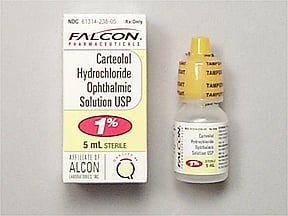
Carteolol Coupons & Savings Card – Discount Prices from $14.02
My prescription
Edit
10ML of 1%, Carteolol (1 Bottle)
Select pharmacy

CVS
$22.73
COUPON PRICE
Walmart
$14.02
COUPON PRICE
Walgreens
$25.06
COUPON PRICE
Albertsons
$30.19
COUPON PRICECarteolol savings card
Show this card to your pharmacist
Walmart
$14.02
BIN
ID
PCN
GRP
019876
LH88A5AC37
CHIPPO
LHX
Powered by
Related beta blockers prescriptions
More prescriptions for glaucoma
Related beta blockers prescriptions
More prescriptions for glaucoma
Carteolol dosage forms
Dosage Quantity Price from Per unit 10ML 1 Bottle $14.02 $14.02 10ML 2 Bottles $35.16 $17.58 10ML 3 Bottles $39.58 $13.19
| Dosage | Quantity | Price from | Per unit |
|---|---|---|---|
| 10ML | 1 Bottle | $14.02 | $14.02 |
| 10ML | 2 Bottles | $35.16 | $17.58 |
| 10ML | 3 Bottles | $39.58 | $13.19 |
Carteolol Warnings
Please review the following safety information regarding the use of carteolol eye drops. This medication, a type of beta blocker, contains potential risks and precautions that you should be aware of. If you have any concerns, consult your healthcare provider.
Hidden Symptoms of Low Blood Sugar: Individuals with diabetes may not experience the typical symptoms of low blood sugar, such as sweating and dizziness, when using beta blockers. Although the absorption of carteolol into the bloodstream is minimal, discuss with your healthcare provider whether you should monitor your blood sugar levels more closely.
Hidden Symptoms of Overactive Thyroid: People with an overactive thyroid may not recognize hyperthyroidism symptoms like a rapid heartbeat when using beta blockers. It's vital to inform your healthcare provider about any thyroid conditions before starting carteolol.
Muscle Weakness: Beta blockers can lead to muscle weakness, potentially causing droopy eyelids. If you notice any muscle weakness after beginning carteolol, contact your healthcare provider.
Trouble Breathing (Bronchospastic Disease): Carteolol, like other beta blockers, is generally not recommended for individuals with bronchospastic diseases such as asthma or COPD due to the risk of breathing difficulties. Although the risk is lower with carteolol because of its minimal absorption, inform your healthcare provider if you have a history of lung problems.
Higher Risk or Worsening of Heart Failure: In rare instances, carteolol may cause or worsen heart failure. Seek medical advice if you experience symptoms such as swelling in the feet or ankles, a fast or irregular pulse, or shortness of breath when lying down or exercising. This is particularly relevant for those with congestive heart failure or a history of heart block.
Please ensure that your healthcare provider is aware of your medical history and any pre-existing conditions to avoid potential complications while using carteolol.
Carteolol Side Effects
Common side effects:
- Blurred vision
- Eye irritation
- Burning
- Tearing
- Redness
- Swelling
Less common but important to monitor:
- Blurry or clouded vision
- Light sensitivity
- Difficulty seeing at night
- Drooping eyelids
Serious side effects:
- Eye pain
- Swelling
- Discharge
- Increased sensitivity to light
- Mental or mood changes such as depression
- Signs of heart failure (swelling of ankles or feet, unusual tiredness, sudden weight gain)
- Slow or irregular heartbeat
- Dizziness
- Trouble breathing
- Chest pain
- Fainting
- Weakness on one side of the body
- Trouble speaking
- Seizures
- Confusion
- Sudden vision changes
- Allergic reaction (rash, swelling, severe dizziness, breathing difficulties)
Carteolol Interactions
Interactions with high risk of serious adverse effects and should be avoided:
- Albuterol
- Ceritinib
- Clonidine
- Crizotinib
- Diltiazem
- Dronedarone
- Epinephrine
- Fenoldopam
- Fingolimod
- Formoterol
- Indacaterol
- Iobenguane I 131
- Iohexol
- Lacosamide
- Levalbuterol
- Olodaterol
- Oxymetazoline
- Ponesimod
- Rivastigmine
- Salmeterol
- Terbutaline
- Verapamil
- Vilanterol
Interactions with moderate risk that may require dose adjustment, closer monitoring, or timing changes:
- Acarbose
- Aceclofenac
- Acemetacin
- Acetyldigoxin
- Albiglutide
- Alfuzosin
- Alogliptin
- Amtolmetin Guacil
- Arbutamine
- Aspirin
- Bromfenac
- Bufexamac
- Bunazosin
- Canagliflozin
- Celecoxib
- Chlorpropamide
- Choline Salicylate
- Clonixin
- Dapagliflozin
- Deslanoside
- Dexibuprofen
- Dexketoprofen
- Diclofenac
- Diflunisal
- Digitoxin
- Digoxin
- Dipyrone
- Doxazosin
- Droxicam
- Dulaglutide
- Empagliflozin
- Ertugliflozin
- Etodolac
- Etofenamate
- Etoricoxib
- Exenatide
- Felbinac
- Fenoprofen
- Fepradinol
- Feprazone
- Floctafenine
- Flufenamic Acid
- Flurbiprofen
- Glimepiride
- Glipizide
- Glyburide
- Ibuprofen
- Indomethacin
- Insulin Aspart, Recombinant
- Insulin Degludec
- Insulin Detemir
- Insulin Glargine, Recombinant
- Insulin Glulisine
- Insulin Human Inhaled
- Insulin Human Isophane (NPH)
- Insulin Human Regular
- Insulin Lispro, Recombinant
- Ketoprofen
- Ketorolac
- Linagliptin
- Liraglutide
- Lixisenatide
- Lornoxicam
- Loxoprofen
- Lumiracoxib
- Meclofenamate
- Mefenamic Acid
- Meloxicam
- Metformin
- Metildigoxin
- Mibefradil
- Miglitol
- Morniflumate
- Moxisylyte
- Nabumetone
- Naproxen
- Nateglinide
- Nepafenac
- Niflumic Acid
- Nimesulide
- Nimesulide Beta Cyclodextrin
- Oxaprozin
- Oxyphenbutazone
- Parecoxib
- Phenoxybenzamine
- Phentolamine
- Phenylbutazone
- Piketoprofen
- Pioglitazone
- Piroxicam
- Pramlintide
- Pranoprofen
- Prazosin
- Proglumetacin
- Propyphenazone
- Proquazone
- Repaglinide
- Rifapentine
- Rofecoxib
- Rosiglitazone
- Salicylic Acid
- Salsalate
- Saxagliptin
- Sitagliptin
- Sodium Salicylate
- St John's Wort
- Sulindac
- Tamsulosin
- Tenoxicam
- Terazosin
- Tiaprofenic Acid
- Tolazamide
- Tolbutamide
- Tolfenamic Acid
- Tolmetin
- Trimazosin
- Urapidil
- Valdecoxib
- Vildagliptin
